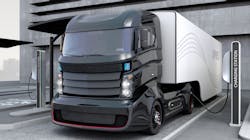There is so much in the news these days about electric vehicles and the more sustainable movement of freight. The latest is California’s ban on diesel truck sales as of 2036 and requiring all trucks to be zero-emission by 2042. Whether you agree with the ban or not, it is not the first effort to legislate clean transportation. I expect there will be challenges to the ruling and that things might change between now and 2036.
However, I think this latest ruling out of California is a good indication of the direction trucking is headed: cleaner engines—whether those are clean diesel, compressed natural gas, battery-electric, hydrogen fuel cell, hydrogen internal combustion, renewable diesel, biodiesel, etc.
See also: DTNA CEO urges decarbonization in trucking to 'move at speed of right'
Before this latest ruling, Glen Kedzie, principal of Energy & Environmental Strategies, spoke at a NationaLease meeting about the EPA, California Air Resources Board (CARB), and low-NOx emission standards. I won't go into the details of the presentation, but I want to share what Kedzie talked about at the end of his presentation as it does a good job of summing up what we can expect as we navigate our way to a cleaner freight future.
What to expect as trucking decarbonizes
Expect fleets to assess their equipment needs, purchase cycles, leasing, and rental equipment options
This is probably something fleets should be doing anyway. I believe a spec review should occur every time new vehicles are ordered because market conditions and customer needs change on a fairly regular basis. It becomes even more important when fleets are faced with a plethora of powertrain options. The point here is that no one technology is right for every fleet or even for every duty cycle within a fleet. Fleets that choose the wrong technology will pay a high cost for their decision, so they need to spend time looking at all the options and choosing those that will have the best total cost of operation for them.
Expect a lead-in to what some are calling historic prebuys
If history is a predictor of future behavior, we will likely see a prebuy before new emissions regulations take effect with the 2027 EPA emissions regulations being the next ones in line. Ever since the EPA began regulating emissions, we have seen fleets buy ahead of the implementation date hoping to avoid the inevitable price increase and the issues associated with operating unfamiliar technology.
Expect a subsequent low/no buy
This is a corollary to the prebuy. If fleets push their buying cycles forward, there is a high likelihood they will go for a period of time with no truck purchases. This, of course, it part of the very cyclical nature of trucking. But keep one thing in mind, older equipment might not be as fuel efficient—regardless of the fuel—so buying ahead may not have as big an impact as a fleet might expect.
Expect sticker shock
Alternative-fueled vehicles currently are more expensive than diesel-powered vehicles. However, complying with the 2027 EPA emissions standards is likely to mean that even diesel-powered vehicles will cost more. In addition, manufacturers of alternative-fueled vehicles are working on bringing the cost of their vehicles down as well and as there is more widespread adoption of these new vehicles economies of scale will bring prices down.
Expect technology glitches
Glitches, bugs, and performance problems are almost a given when a new technology first comes onto the market. The hope is that the vehicle and component manufacturers will quickly respond to any problems that develop with their equipment and make repairs quickly. Traditional truck makers have experience with this from their history of introducing new vehicle models or new engines.
Expect the unexpected
That is probably the best advice. When it comes to major changes, it is hard to predict where all the stumbling blocks will be. Let’s face it, this move to cleaner transportation, even if it includes cleaner-burning diesels, is a major transition for trucking.
The good news is that it is not a transition that has to take place overnight, so we will have time to adjust and adapt. And trucking is very good at that.
Jane Clark is vice president of member services for NationaLease. In this position, she is focused on managing the member services operation as well as working to strengthen member relationships, reduce member costs, and improve collaboration within the NationaLease supporting groups. Prior to joining NationaLease, Clark served as area vice president for Randstad, one of the nation’s largest recruitment agencies, and before that, she served in management posts with QPS Cos., Pro Staff, and Manpower Inc.
About the Author
Jane Clark
Senior VP of Operations
Jane Clark is the senior vice president of operations for NationaLease. Prior to joining NationaLease, Jane served as the area vice president for Randstad, one of the nation’s largest recruitment agencies, and before that, she served in management posts with QPS Companies, Pro Staff, and Manpower, Inc.
